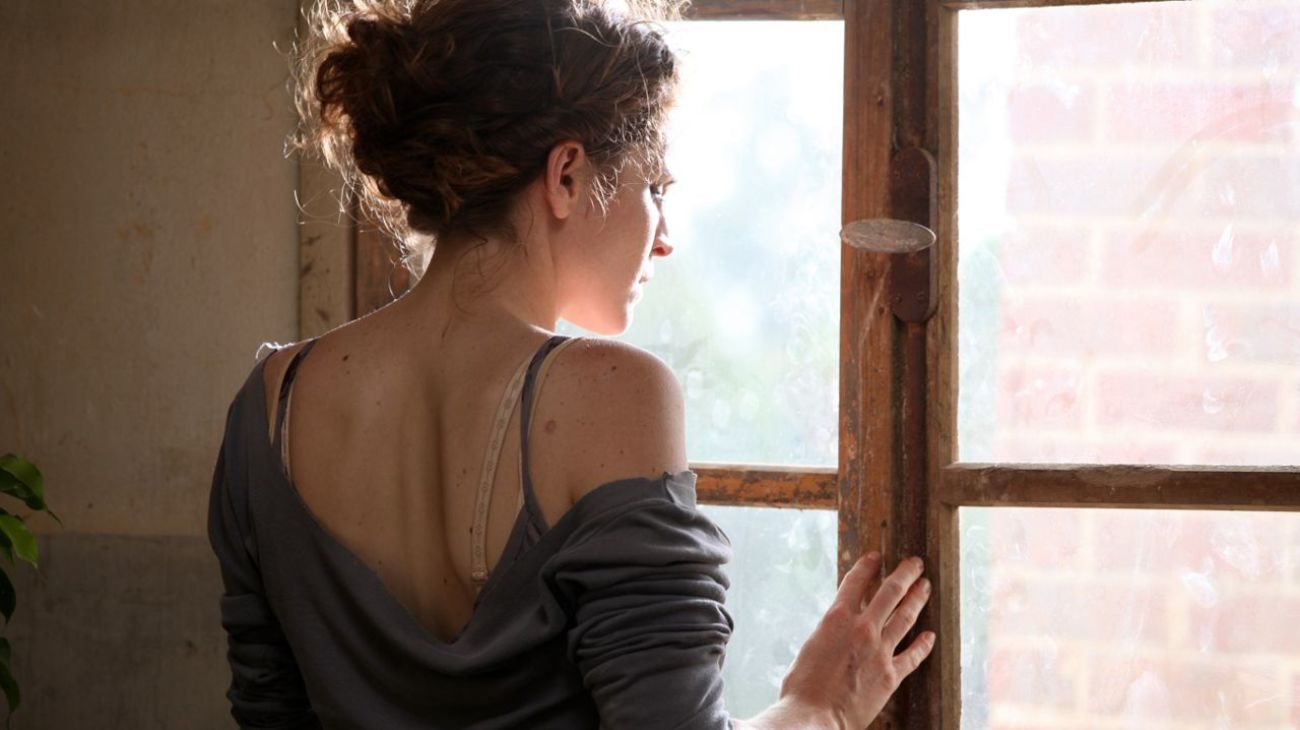
The 47th Chicago International Film Festival
Screens at CIFF: 10/13 & 10/15 & 10/16
World premiere: 12 May, 2011, Cannes Film Festival
If I were to lay out the plot of The Slut all nice and simple, it would sound like Israel is now in the business of exporting its pornography: there's a small farming community out by nowhere, where 35-year-old Tamar (Hagar Ben-Asher, also the writer and director), mother of two, is the willing and enthusiastic sexual partner of pretty much all of the town's menfolk who show an interest. One day, an old son returns to town: Shai (Ishai Golan), a veterinarian, who like everybody else is drawn to Tamar's magnetic sexual freedom, but he's quite a bit more serious than the rest of the fellows who seem to regard her as simply a public service, like running water, which as far as we ever learn is just how she likes it. That is, really, about it as far as plot goes.
But The Slut is about as far from pornography as you can get with a film that does, admittedly, contain a healthy share of sex scenes that are, if not explicit, certainly graphic enough that they don't leave much to the imagination. Much has been made of the fact that the film features a woman directing herself in hardcore sex scenes, and how it does or does not re-appropriate the subject matter for feminism, and this thesis does carry some water; and it carried even more back in 1976, when Chantal Akerman did basically the same thing in Je, tu, il, elle. It's obviously not fair to judge a movie by how it measures up to an experimental feminist movie that most people have neither heard of nor seen, but it gets to the question that The Slut never gets around to answering: why bother? What does this movie say that's so darned special, about sex, about female sexuality, or about Israeli small towns?
Nothing, as far as I can tell. It's unfortunately perhaps the case that a film which non-judgmentally presents an adult woman who enjoys having sex and is deeply conflict by a man's attempt to "tame" her is still shockingly edgy, but even crediting The Slut with that much intellectual fortitude is giving it a lot of benefit of the doubt. It presents, but it does not suggest meaning; other than self-consciously ripping all of the eroticism out of the sex act, there's virtually nothing to suggest that Ben-Asher even has a point of view, feminist or otherwise.
The film does manage to depict the cloistered, gossipy atmosphere of a small town with some degree of facility: the slow-moving camera and menagerie of long takes hang around watching until the viewer almost feels like a part of the community, with the caveat that this town is largely made up of voyeurs of one kind or another. Social observation is, in fact, one of the two things that absolutely work great in The Slut; the other is an clotty atmosphere of caution and foreboding that chokes every inch of the film. It is a doomy sort of movie, though not such that it turns into a thriller or anything even resembling it. It's more that there's always a sense of things about to turn for the worse, and this sense is maybe the exact reason that Ben-Asher keeps us at such a separation from the events and emotions depicted in her movie: the whole film is, in its fashion, about keeping emotions locked off as a form of self-preservation. Or maybe it's all just agonizingly stilted. That is also a possibility.
God, I want to like this movie. It's so easy to see where this could have been great: Tamar is a compelling and difficult character, and the slow reveal of her personality that is the closest thing The Slut has to a narrative arc makes it seem like there's an exceptional movie watching her stride through life. It's not this movie; this movie stares at her without engaging in even the slightest way with her, brooding about with its dusty cinematography and lingering takes. But it's only a half-step from here to whatever version of this plot and character study are truly illuminating and knowing; a half-step that would just require the director to not pursue, so successfully, a completely inexplicable program of building a thick wall of glass between us and her protagonist.
6/10
World premiere: 12 May, 2011, Cannes Film Festival
If I were to lay out the plot of The Slut all nice and simple, it would sound like Israel is now in the business of exporting its pornography: there's a small farming community out by nowhere, where 35-year-old Tamar (Hagar Ben-Asher, also the writer and director), mother of two, is the willing and enthusiastic sexual partner of pretty much all of the town's menfolk who show an interest. One day, an old son returns to town: Shai (Ishai Golan), a veterinarian, who like everybody else is drawn to Tamar's magnetic sexual freedom, but he's quite a bit more serious than the rest of the fellows who seem to regard her as simply a public service, like running water, which as far as we ever learn is just how she likes it. That is, really, about it as far as plot goes.
But The Slut is about as far from pornography as you can get with a film that does, admittedly, contain a healthy share of sex scenes that are, if not explicit, certainly graphic enough that they don't leave much to the imagination. Much has been made of the fact that the film features a woman directing herself in hardcore sex scenes, and how it does or does not re-appropriate the subject matter for feminism, and this thesis does carry some water; and it carried even more back in 1976, when Chantal Akerman did basically the same thing in Je, tu, il, elle. It's obviously not fair to judge a movie by how it measures up to an experimental feminist movie that most people have neither heard of nor seen, but it gets to the question that The Slut never gets around to answering: why bother? What does this movie say that's so darned special, about sex, about female sexuality, or about Israeli small towns?
Nothing, as far as I can tell. It's unfortunately perhaps the case that a film which non-judgmentally presents an adult woman who enjoys having sex and is deeply conflict by a man's attempt to "tame" her is still shockingly edgy, but even crediting The Slut with that much intellectual fortitude is giving it a lot of benefit of the doubt. It presents, but it does not suggest meaning; other than self-consciously ripping all of the eroticism out of the sex act, there's virtually nothing to suggest that Ben-Asher even has a point of view, feminist or otherwise.
The film does manage to depict the cloistered, gossipy atmosphere of a small town with some degree of facility: the slow-moving camera and menagerie of long takes hang around watching until the viewer almost feels like a part of the community, with the caveat that this town is largely made up of voyeurs of one kind or another. Social observation is, in fact, one of the two things that absolutely work great in The Slut; the other is an clotty atmosphere of caution and foreboding that chokes every inch of the film. It is a doomy sort of movie, though not such that it turns into a thriller or anything even resembling it. It's more that there's always a sense of things about to turn for the worse, and this sense is maybe the exact reason that Ben-Asher keeps us at such a separation from the events and emotions depicted in her movie: the whole film is, in its fashion, about keeping emotions locked off as a form of self-preservation. Or maybe it's all just agonizingly stilted. That is also a possibility.
God, I want to like this movie. It's so easy to see where this could have been great: Tamar is a compelling and difficult character, and the slow reveal of her personality that is the closest thing The Slut has to a narrative arc makes it seem like there's an exceptional movie watching her stride through life. It's not this movie; this movie stares at her without engaging in even the slightest way with her, brooding about with its dusty cinematography and lingering takes. But it's only a half-step from here to whatever version of this plot and character study are truly illuminating and knowing; a half-step that would just require the director to not pursue, so successfully, a completely inexplicable program of building a thick wall of glass between us and her protagonist.
6/10






